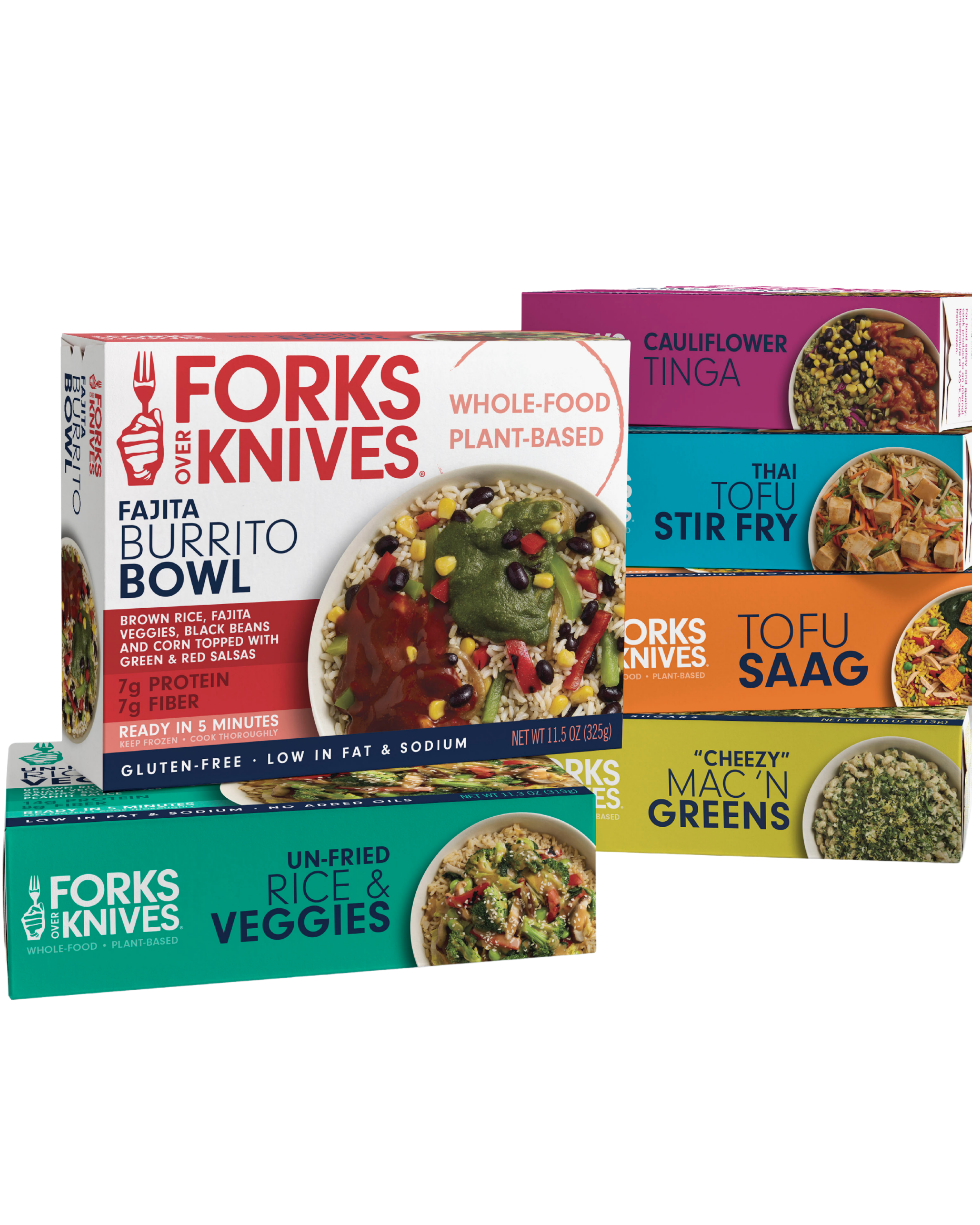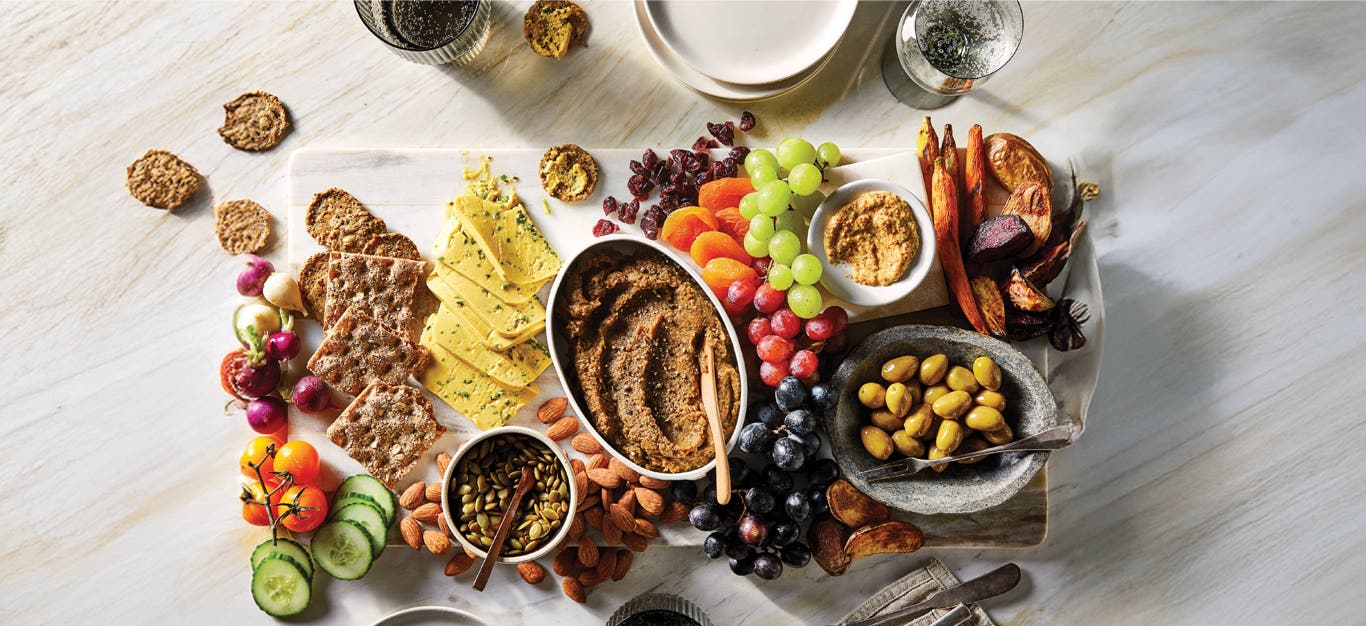As an internal medicine physician and director of an obesity program, I am all too familiar with the struggle that many people face when it comes to weight loss. The statistics in my primary care practice mirror the U.S. national numbers: more than 70% of us are overweight or obese.[i] I’ve seen many people attempt to lose weight, become frustrated and disheartened, and turn to supplements, pills, meal replacements, unhealthy fad diets, and surgery. Unfortunately, most of these are short-term solutions without long-term weight-loss benefits (often accompanied by troubling health consequences).
The mechanisms that regulate our body weight are highly complex – neurologic, genetic, hormonal, environmental, social, and even microbiologic factors are at play. But these factors do not necessarily determine our destiny! We have the power to override them with the food and lifestyle choices we make every day.
Here are twelve of my favorite weight-loss tips:
1. Start “crowding out” animal products, high-fat foods, and processed foods.
Gradually add more whole plant foods to your diet. You can begin with plant foods you already like and build from there. Eat a whole plant food (such as a piece of fruit) or a dish made from whole plants (such as a vegetable or bean soup or a salad) before one of your usual meals, so that you won’t have as much room for the less-healthful foods.
If you are ready to make the full leap to a whole-food, plant-based diet, you will likely see benefits even faster. Consider trying one of the many plant-based/vegan “kickstart” programs available online or in print.
2. Focus on the positive—the nutrient-dense, high-fiber foods you are adding to your diet—instead of what you are taking away.
Enjoy experiencing new flavors (this is what I call “taste-bud rehab”), rather than focusing your mental energy on the unhealthy foods you are trying to remove from your diet.
3. Choose the right kind of carbs!
Avoid processed carbs, such as white bread, white rice, and white pastas, even if they are vegan/plant-based. Stick to whole plant foods in their most natural form—brown or wild rice, quinoa, barley, oats, sweet potatoes, beans, lentils, and of course, an abundance of colorful vegetables and fruits.
4. Remember that oil is a processed food.
Oil is very dense in calories, so it can easily sabotage your weight-loss efforts. Oil-based salad dressings, for example, dramatically increase the calories in a salad.
5. Avoid liquid calories.
Don’t drink your calories, especially in the form of sports drinks, sodas, other sweetened beverages, and alcohol. The calories in these drinks add up fast and don’t fill you up. And for weight loss, in my experience, eating whole fruit trumps drinking fruit juice. Water is the only beverage we actually need.
6. Have conversations with your family and/or close friends.
Talk to the people you live with about how they can best support your weight-loss efforts. Many of us have cravings for certain junk foods and/or sugary desserts, and when these items are readily available in the kitchen, it’s pretty challenging to resist them. Ideally, family members should be on board with not bringing these foods into your house. In my practice, I encourage my patients to bring their partners and other family members to their appointments with them, so we can talk about behavior changes together.
7. Track positive behaviors (such as taking a walk at lunch, trying a new vegetable, or avoiding a sugary coffee beverage).
Keep track of the positives, so that you can look back and see the progress you are making. Many of these changes have important health benefits, independent of weight loss. Also, keep in mind that losing just 5% of your body weight can have significant health benefits if you are overweight or obese.
8. Aim for at least 30 minutes of physical activity most days of the week.
Your daily activity can be as simple as walking. Although dietary changes tend to be more effective than exercise for weight loss, exercise is key to preventing weight regain and has numerous other health benefits.
9. Eat as mindfully as you can.
Whenever possible, avoid reading or using technology (television, computer, phone, gaming, etc.) while eating. Savor each bite and focus on the experience of tasting your food.
10. Be aware of your hunger cues.
Rate your hunger on a scale of 1 to 10, where 1 is very full and 10 is extremely hungry. Don’t let yourself get to a 9 or 10. This requires some planning. Eat something when your hunger level reaches 7 or 8, so that you won’t become ravenous later and make a desperate, unhealthy food decision.
11. Don't worry if you don’t lose weight right away.
The rate at which people lose weight depends on many factors, including activity level, age, muscle mass, health conditions and medications, and of course caloric intake. I don’t encourage setting goals around the rate of weight loss. Rather, focus on behavior and health goals, such as cooking at home more often, eating more servings of whole plant foods, and increasing physical activity. For most people, this approach will result in safe and sustainable weight loss. I’m not a fan of fasting for weight loss, meal replacement programs, weight-loss pills/supplements, or other practices that are not durable and do not promote long-term health.
12. What if you are already eating plant-based but not losing weight?
Examine whether you are eating refined carbohydrates and other processed foods on a regular basis. Look out for added oils and sugars in your food. Are you eating out at restaurants and/or getting take-out regularly? These meals tend to be much higher in calories than similar meals prepared at home. Finally, consider reducing portions of calorie-dense foods such as dried fruits, nuts, olives, seeds, and avocados. Find more tips here: Losing Weight on a Plant-Based Diet.
So what is the best way to eat for weight loss and overall health?
We’ve known for a long time, from large-scale observational studies, that vegetarians and vegans consistently have lower body mass indexes and significantly lower rates of obesity compared with omnivores.[ii],[iii],[iv],[v],[vi] Research also shows that animal products are linked to weight gain[vii],[viii],[ix],[x],[xi],[xii] and that plant-based diets are effective for weight loss,[xiii],[xiv],[xv],[xvi] without calorie counting or measuring portions.[v],[xv],[xvi] This is likely due in part to the high fiber content, which promotes satiety without excess calories.
Research aside, thousands of personal anecdotal reports and years of clinical experience attest to the fact that people who begin following a whole-food, plant-based diet almost always lose weight, and sometimes dramatically!
Probably the most important benefit of following a plant-based diet for weight loss is that it also decreases the risk of heart disease, high blood pressure, high cholesterol, diabetes, dementia, certain cancers, and even death.[xvii],[xviii] I know of no other “weight-loss diet” that can make such a claim. As a physician, I don’t think we should be separating weight issues from other health risks. I question the wisdom of following a diet (high-protein, low-carb, for example) that might help you lose weight in the short term but increases your chance of having significant health problems later on.
Ready to get started? Learn more about the life-saving plant-based diet, access hundreds of delicious free recipes, buy and download our convenient app, and register for our online cooking course!
Sources:
[i]Prevalence of Overweight, Obesity, and Extreme Obesity Among Adults: United States, 1960–1962 Through 2011–2012.
[ii] Rizzo NS et al. Nutrient profiles of vegetarian and nonvegetarian dietary patterns. J Acad Nutr Diet 2013 Dec;113(12):1610–9.
[iii] Spencer EA et al. Diet and body mass index in 38 000 EPIC-Oxford meat-eaters, fish-eaters, vegetarians and vegans. Int J Obesity 2003;27:728–734.
[iv] Tonstad S et al. Type of vegetarian diet, body weight, and prevalence of type 2 diabetes. Diabetes Care 2009 May; 32(5): 791–796.
[v] Berkow SE et al. Vegetarian diets and weight status. Nutr Rev 2006 Apr;64(4):175–88.
[vi] Wang Y et al. Meat consumption is associated with obesity and central obesity among US adults. Int J Obes 2009 Jun;33(6):621–8.
[vii] Vergnaud AC et al. Meat consumption and prospective weight change in participants of the EPIC-PANACEA study. Am J Clin Nutr 2010;92:398–407.
[viii] Rosell M et al. Weight gain over 5 years in 21,966 meat-eating, fish-eating, vegetarian, and vegan men and women in EPIC-Oxford. Int J Obes 2006 Sep;30(9):1389–96.
[ix] Halkjær J et al. Intake of total, animal and plant protein and subsequent changes in weight or waist circumference in European men and women: the Diogenes project. Int J Obes 2011 Aug;35(8):1104–13.
[x] Hernández-Alonso P et al. High dietary protein intake is associated with an increased body weight and total death risk. Clin Nutr 2015 Apr 7. pii: S0261-5614(15)00091–6.
[xi] Vergnaud AC et al. Macronutrient composition of the diet and prospective weight change in participants of the EPIC-PANACEA study. PLoS ONE 2013;8:e57300
[xii] Vang A et al. Meats, processed meats, obesity, weight gain and occurrence of diabetes among adults: findings from Adventist Health Studies. Ann Nutr Metab 2008;52(2):96–104.
[xiii] Turner-McGrievy G et al. A two-year randomized weight loss trial comparing a vegan diet to a more moderate low-fat diet. Obesity 2007 Sep;15(9):2276–81.
[xiv] Turner-McGrievy GM et al. Comparative effectiveness of plant-based diets for weight loss: a randomized controlled trial of five different diets. Nutrition 2015 Feb;31(2):350–8.
[xv] Barnard ND. The effects of a low-fat, plant-based dietary intervention on body weight, metabolism, and insulin sensitivity. Am J Med 2005 Sep;118(9):991–7.
[xvi] Barnard ND et al. A systematic review and meta-analysis of changes in body weight in clinical trials of vegetarian diets. J Acad Nutr Diet 2015 Jun;115(6):954–69.
[xvii] Fraser GE. Vegetarian diets: what do we know of their effects on common chronic diseases? Am J Clin Nutr 2009;89(suppl):1607S–12S.
[xviii] Tuso et al. Nutritional update for physicians: plant-based diets. Permanente Journal 2013;17(2):61–5.

Related News
New Frozen Meals!

Introducing our new frozen meals: Doctor-recommended, chef-crafted, & ready in minutes.


